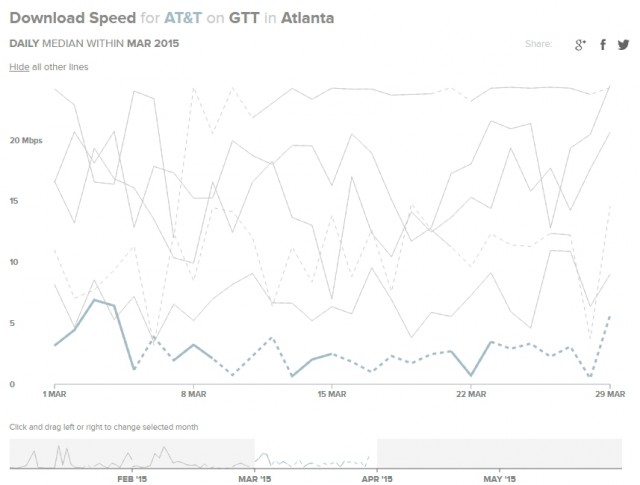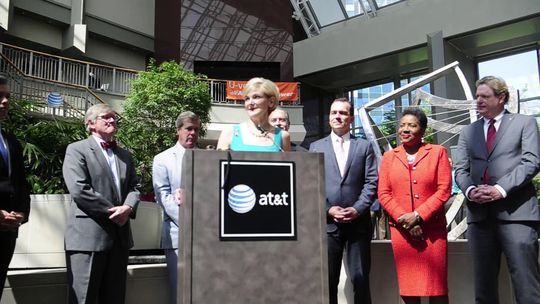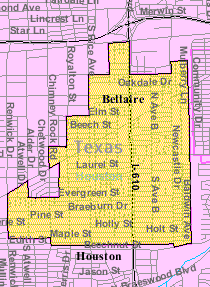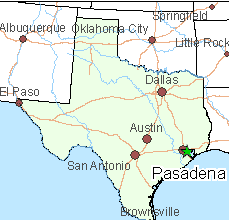 If your YouTube, Netflix, or Amazon Video experience isn’t what it should be, your Internet Service Provider is likely to blame.
If your YouTube, Netflix, or Amazon Video experience isn’t what it should be, your Internet Service Provider is likely to blame.
A consumer group today implicated several major Internet providers including Comcast, AT&T, Time Warner Cable and Verizon in an Internet slowdown scheme that prevented customers from getting the broadband performance they are paying for.
A study* of 300,000 Internet users conducted by Battleforthenet found evidence some of America’s largest providers are not adequately providing connectivity for Content Delivery Networks (CDNs) that supply high-capacity traffic coming from the Internet’s most popular websites.
Significant performance degradation was measured on the networks of the five largest American ISPs, which provide Internet connectivity for 75% of U.S. households.
“For too long, Internet access providers and their lobbyists have characterized Net Neutrality protections as a solution in search of a problem,” Tim Karr from Free Press told the Guardian newspaper, which had advance notice of the study. “Data compiled using the Internet Health Test show us otherwise – that there is widespread and systemic abuse across the network. The irony is that this trove of evidence is becoming public just as many in Congress are trying to strip away the open Internet protections that would prevent such bad behavior.”
 The study revealed network performance issues that would typically be invisible to most broadband customers performing generic speed tests to measure their Internet speed. The Open Technology Institute’s M-Lab devised a more advanced speed test that would compare the performance of high traffic CDNs across several providers. CDNs were created to reduce the distance between a customer and the content provider and balance high traffic loads more evenly to reduce congestion. The shorter the distance a Netflix movie has to cross, for example, the less of a chance network problems will disrupt a customer’s viewing.
The study revealed network performance issues that would typically be invisible to most broadband customers performing generic speed tests to measure their Internet speed. The Open Technology Institute’s M-Lab devised a more advanced speed test that would compare the performance of high traffic CDNs across several providers. CDNs were created to reduce the distance between a customer and the content provider and balance high traffic loads more evenly to reduce congestion. The shorter the distance a Netflix movie has to cross, for example, the less of a chance network problems will disrupt a customer’s viewing.
If technicians controlled the Internet, the story would end there. But it turns out money has gotten between Internet engineers with intentions of moving traffic as efficiently as possible and the executives who want to be paid something extra to carry the traffic their customers want.
That may explain why Comcast can deliver 21.4Mbps median download speeds for traffic distributed by a CDN Tier1 IP network called GTT to customers in Atlanta, while AT&T only managed to squeeze through around 200kbps — one-fifth of 1Mbps. It turns out AT&T’s connection with GTT may be maxed out and AT&T will not upgrade capacity to a network that sends AT&T customers more than twice the traffic it receives from them without direct compensation from GTT.

Internet traffic jam, at least for AT&T customers in Atlanta trying to reach content delivered by GTT.
An AT&T U-verse customer in Atlanta would probably not attribute the poor performance depicted in M-Lab’s performance test directly to AT&T because Internet responsiveness for other websites would likely appear normal. Customers might blame the originating website instead. But M-Lab’s performance results shows the trouble is limited to AT&T, not other providers like Comcast.

AT&T: Slow down, you move too fast.
The issues of performance and peering agreements that provide enough capacity to meet demand are close cousins of Net Neutrality, which is supposed to prevent content producers from being forced to pay for assurances their traffic will reach end users. But that seems to be exactly what AT&T is asking for from GTT.
“It would be unprecedented and unjustified to force AT&T to provide free backbone services to other backbone carriers and edge providers, as Cogent et al seek,” AT&T wrote in response to a request from several CDNs to disallow AT&T’s merger with DirecTV. “Nor is there any basis for requiring AT&T to augment network capacity for free and without any limits. Opponents’ proposals would shift the costs of their services onto all AT&T subscribers, many of whom do not use Opponents’ services, and would harm consumers.”
* – When a copy of the study becomes publicly available, we will supply a link to it.
Correction: It is more accurate to describe GTT as a “Tier1 IP network” which supplies services to CDN’s, among others. More detail on what GTT does can be found here.


 Subscribe
Subscribe


 According to the National Institute of Money in Politics, telecommunications industry interests wrote at least $643,000 in campaign contribution checks to Tennessee politicians during the two-year 2014 election cycle. AT&T alone put $211,000 into the pockets of legislators. The Tennessee Registry of Election Finance reports AT&T contributed $20,000 during the last election cycle to Republican Lt. Gov. Ron Ramsey’s leadership political action committee, RAAMPAC. AT&T President Joelle Phillips personally gave another $2,000.
According to the National Institute of Money in Politics, telecommunications industry interests wrote at least $643,000 in campaign contribution checks to Tennessee politicians during the two-year 2014 election cycle. AT&T alone put $211,000 into the pockets of legislators. The Tennessee Registry of Election Finance reports AT&T contributed $20,000 during the last election cycle to Republican Lt. Gov. Ron Ramsey’s leadership political action committee, RAAMPAC. AT&T President Joelle Phillips personally gave another $2,000.
 Houston residents excited by this week’s launch of AT&T U-verse with GigaPower have been quickly disappointed after learning the service is available practically nowhere in Houston and likely won’t be for some time.
Houston residents excited by this week’s launch of AT&T U-verse with GigaPower have been quickly disappointed after learning the service is available practically nowhere in Houston and likely won’t be for some time.
 “I dropped AT&T’s MaxPlus because I never got anything approaching the 18Mbps speed I was being billed for,” he wrote.
“I dropped AT&T’s MaxPlus because I never got anything approaching the 18Mbps speed I was being billed for,” he wrote.